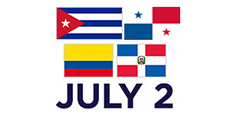Rockies to sign SS Amador, No. 12 int’l prospect
The Rockies are adding one of the top shortstops in this year’s international class to their Minor League system.
According to industry sources, the club has agreed to a $1.5 million deal with infielder Adael Amador, ranked No. 12 on MLB Pipeline’s Top 30 International Prospects list.
The Rockies have not confirmed the deal.
• International prospect signings
The switch-hitting Amador has tons of athleticism. He has impressed evaluators with good bat speed and an aggressive approach from both sides of the plate. Add good rhythm and timing mechanism when he’s in the batter’s box, and there’s a chance Amador will develop into an above-average hitter with some power. He’s also improved as a runner and shows good instincts on the bases, a byproduct of playing in so many games and tournaments across the Dominican Republic as a youth league player.
On defense, the teen is a solid defender with plus arm potential. He shows soft hands and proper footwork and often makes the difficult plays look easy.
• Top 30 International Prospects
The Rockies are also linked to left-handed pitcher Alberto Pacheco from Santo Domingo, D.R. for $400,000, and they are also expected to sign outfielders Elisandro Alcantara and Oscar Aude of the Dominican Republic for $400,000.
According to the rules established by the Collective Bargaining Agreement, clubs like the Rockies that receive a Competitive Balance Pick in Round B of the Rule 4 Draft have the most money with a pool of $6,481,200 for spending on international prospects, while clubs that receive a Competitive Balance Pick in Round A of the Rule 4 Draft receive the second most at $5,939,800.
Teams are allowed to trade as much of their international pool money as they would like, but can only acquire 60 percent of a team's initial pool amount. Additionally, signing bonuses of $10,000 or less do not count toward a club's bonus pool, and foreign professional players who are at least 25 years of age and have played in a foreign league for at least six seasons are also exempt.
Under the previous system, teams were penalized for exceeding their bonus pools with consequences that ranged from taxes on their spending to the maximum penalty, which was being prohibited from signing any prospect for more than $300,000 during the next two signing periods. That’s no longer the case and there are no longer penalties. Teams can only spend their allotted bonus pools and the monies acquired via trade.
